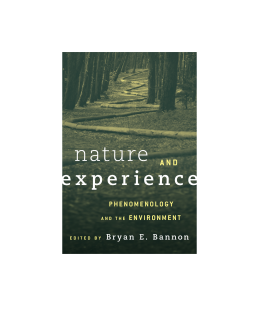
Additional Information
Book Details
Abstract
What do we mean when we speak about and advocate for ‘nature’? Do inanimate beings possess agency, and if so what is its structure? What role does metaphor play in our understanding of and relation to the environment? How does nature contribute to human well-being?
By bringing the concerns and methods of phenomenology to bear on questions such as these, this book seeks to redefine how environmental issues are perceived and discussed and demonstrates the relevance of phenomenological inquiry to a broader audience in environmental studies. The book examines what phenomenology must be like to address the practical and philosophical issues that emerge within environmental philosophy, what practical contributions phenomenology might make to environmental studies and policy making more generally, and the nature of our human relationship with the environment and the best way for us to engage with it.
Bryan E. Bannon is Associate Professor of Philosophy and Director of the Environmental Studies and Sustainability programme at Merrimack College. He is the author of From Mastery to Mystery: A Phenomenological Foundation for an Environmental Ethic (2014).
Contributors: David E. Cooper, Professor of Philosophy Emeritus, Durham University, UK; Janet Donohoe, Professor of Philosophy, University of West Georgia, USA; Thomas Greaves, Senior Lecturer in Philosophy, University of East Anglia, UK; Simon P. James, Senior Lecturer in Philosophy, Durham University, UK; Guobjörg Rannveig Jóhannesdóttir, Graduate Student, University of Iceland; Irene Klaver, Professor of Philosophy, University of North Texas, USA; Scott Marratto, Assistant Professor of Philosophy, Michigan Technological University, USA; Barbara Muraca, Assistant Professor of Philosophy, Oregon State University, USA; Tim Christian Myers, Graduate Student, University of Oregon, USA; Bryan Smith, Associate Professor of Philosophy, University of Mississippi, USA; Elise Springer, Associate Professor of Philosophy, Wesleyan University, USA; Ingrid Leman Stefanovic, Dean, Faculty of Environment, Simon Fraser University, Canada; Mark Thorsby, Professor of Philosophy, Lone Star College, USA
This collection deserves to be read not just by those working in "continental" environmental philosophy but also by environmental philosophers more broadly. Its clear, well-written essays grapple with and reconceptualize some of the area's key questions, and do so in novel and refreshing ways. Many of them would work well even in an undergraduate environmental philosophy course, and could bring something really new to such a setting.
Nature and Experience is an important contribution to the ongoing development of eco-phenomenology and environmental hermeneutics. Grounded in a commitment to the relationality at the heart of the phenomenological project, this volume sparkles with insight on topics as varied as anthropocentrism, moral responsibility, metaphor, ecological imagination, environmental justice, and aesthetics—and does so in a manner that is eminently accessible.
Brian Treanor, Charles S. Casassa Chair and Professor of Philosophy, Loyola Marymount University
A sparkling collection of essays from some of today’s liveliest minds writing in a broadly phenomenological tradition. It highlights the complexity of our experience of nature, the range of metaphors, narratives and normativities woven into the idea of nature, and the relevance of an experiential approach to how our understanding of nature impacts education, decolonization and aesthetics. A compelling addition to the environmental philosophy literature.
David Wood, W. Alton Jones Professor of Philosophy and Professor of European Studies, Vanderbilt University
Table of Contents
| Section Title | Page | Action | Price |
|---|---|---|---|
| Contents | 7 | ||
| Introduction | 9 | ||
| Part I: Phenomenology of Nature | 21 | ||
| Chapter One: Mythic Enlightenment | 23 | ||
| Chapter Two: Towards a Phenomenology of Nature | 37 | ||
| Chapter Three: Natural Phenomena | 51 | ||
| Chapter Four: Phenomenology and the Charge of Anthropocentrism | 63 | ||
| Chapter Five: Nature, Meaning and Value | 73 | ||
| Part II: Metaphor, Agency, and the Human Relation to Nature | 87 | ||
| Chapter Six: Intersubjectivity, the Environment and Moral Failure | 89 | ||
| Chapter Seven: Metaphor and Weather | 101 | ||
| Chapter Eight: Ecofeminism, Ecophenomenology and the Metaphorics of Nature’s Agency | 117 | ||
| Chapter Nine: Re-Rivering Environmental Imagination | 133 | ||
| Part III: Practicing Phenomenology | 147 | ||
| Chapter Ten: Paradigms, Praxis and Environmental Phenomenology | 149 | ||
| Chapter Eleven: Re-appropriating the Ecosystem Services Concept for a Decolonization of ‘Nature’ | 163 | ||
| Chapter Twelve: Indigenous Experience, Environmental Justice and Settler Colonialism | 177 | ||
| Chapter Thirteen: Music and the Presence of Nature | 195 | ||
| Chapter Fourteen: Phenomenological Aesthetics of Landscape and Beauty | 207 | ||
| References | 221 | ||
| Index | 237 | ||
| About the Contributors | 241 |
